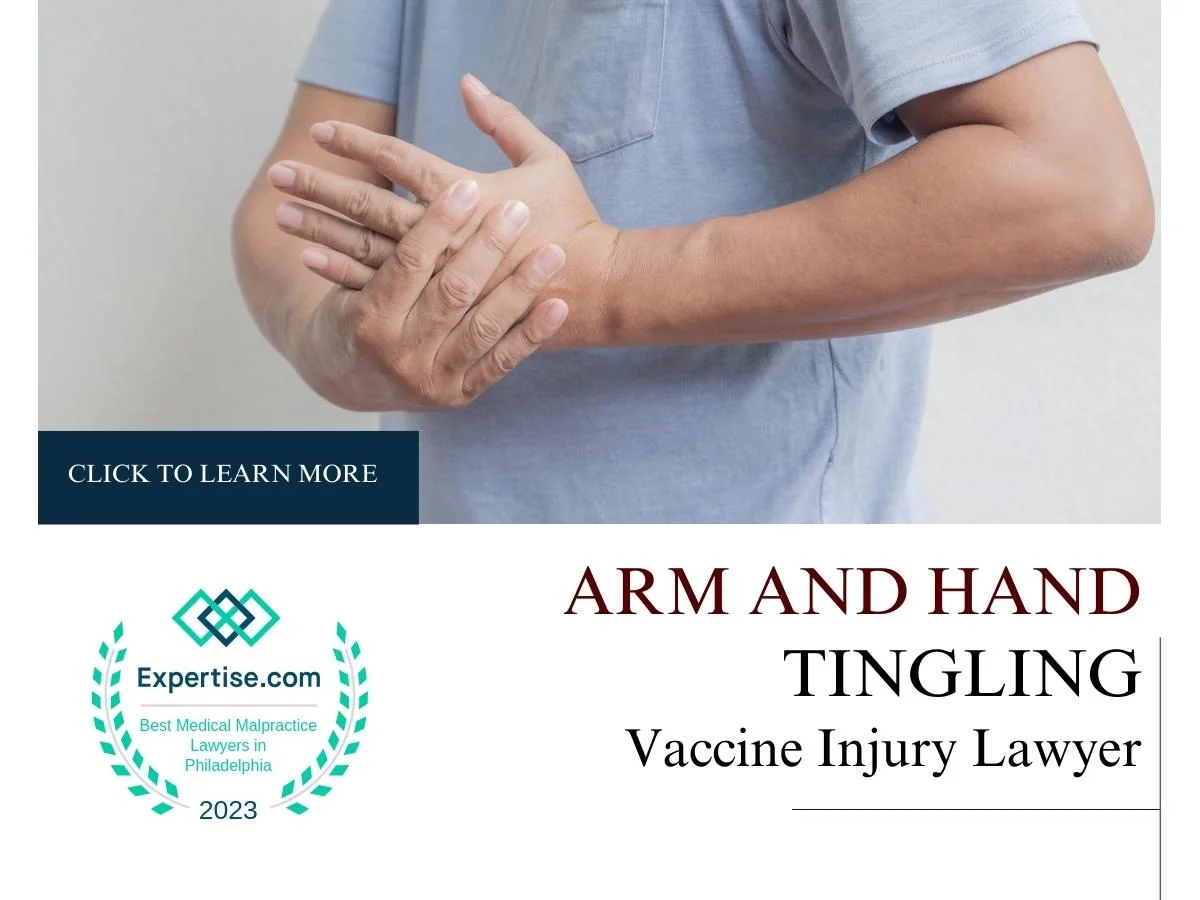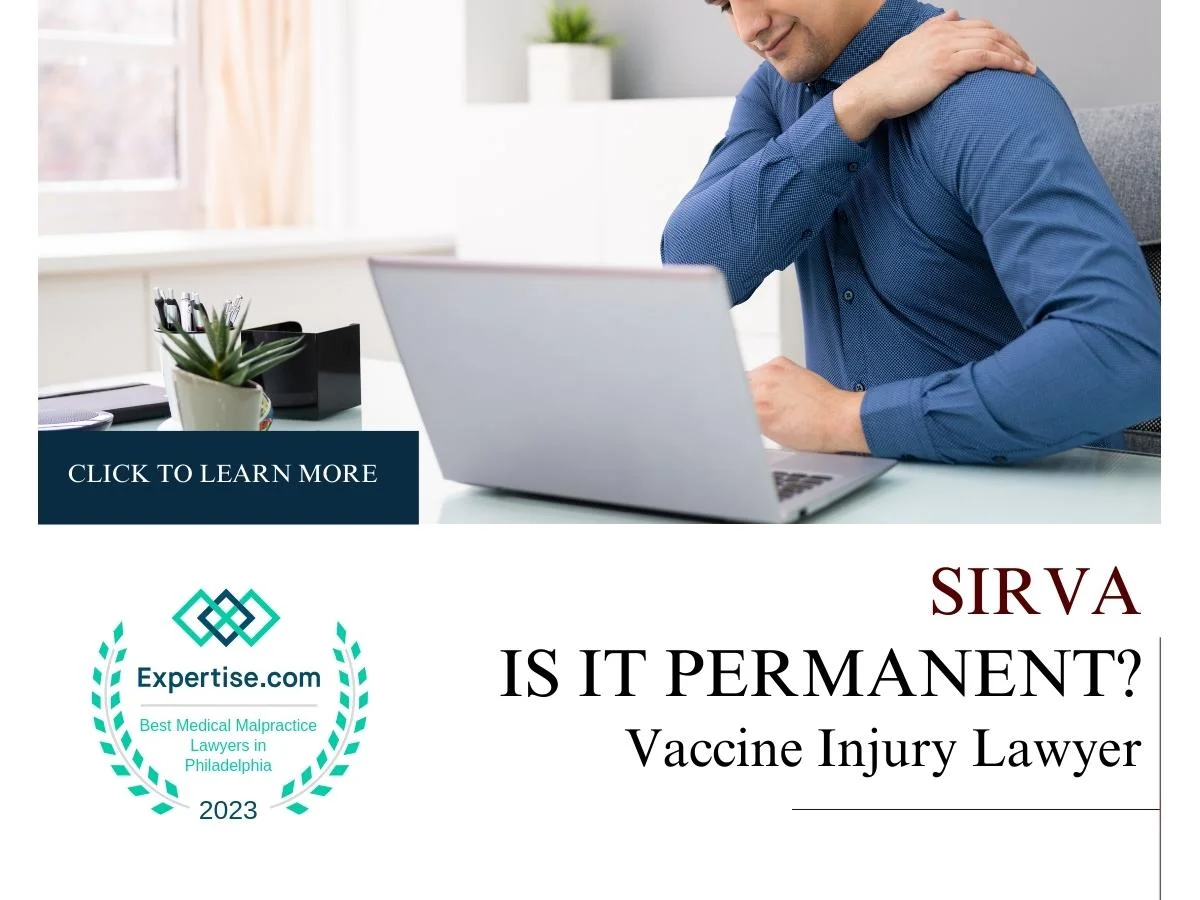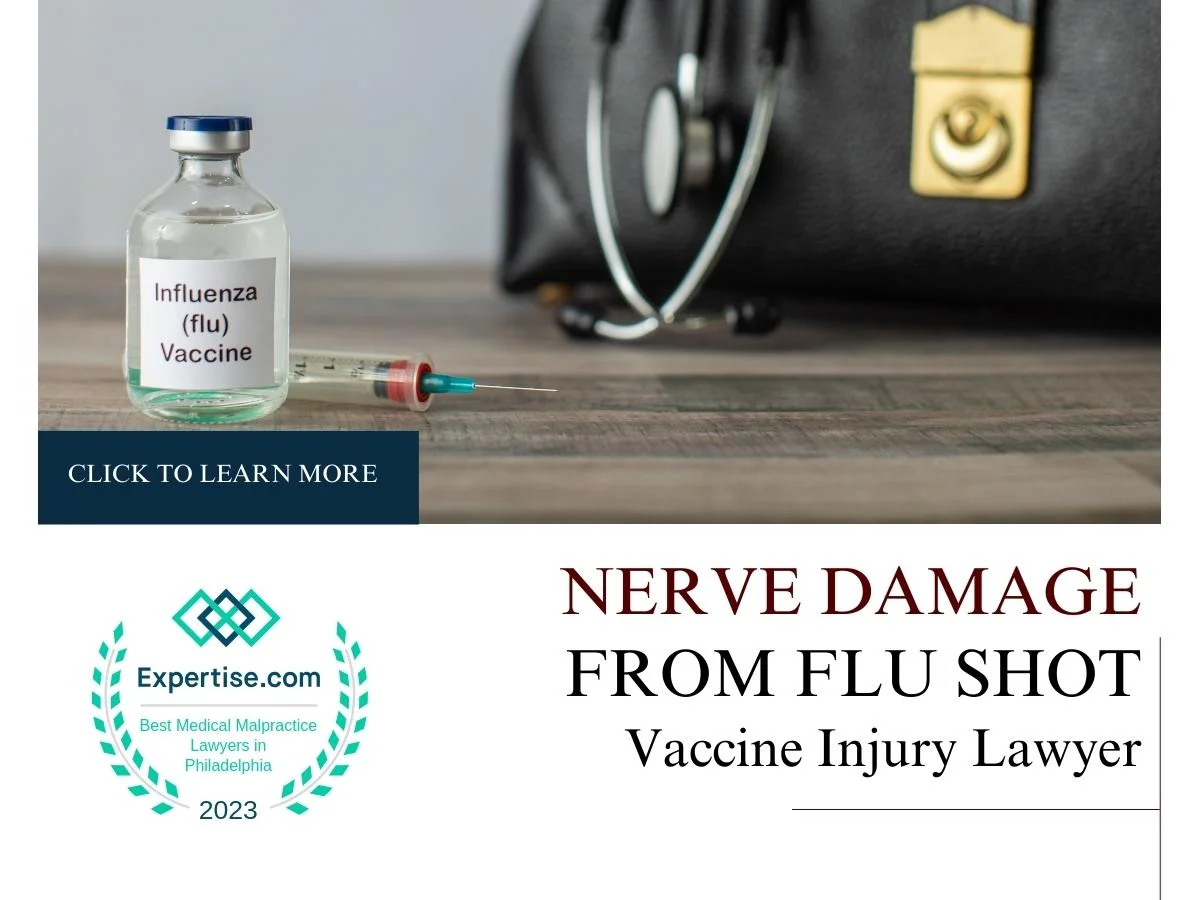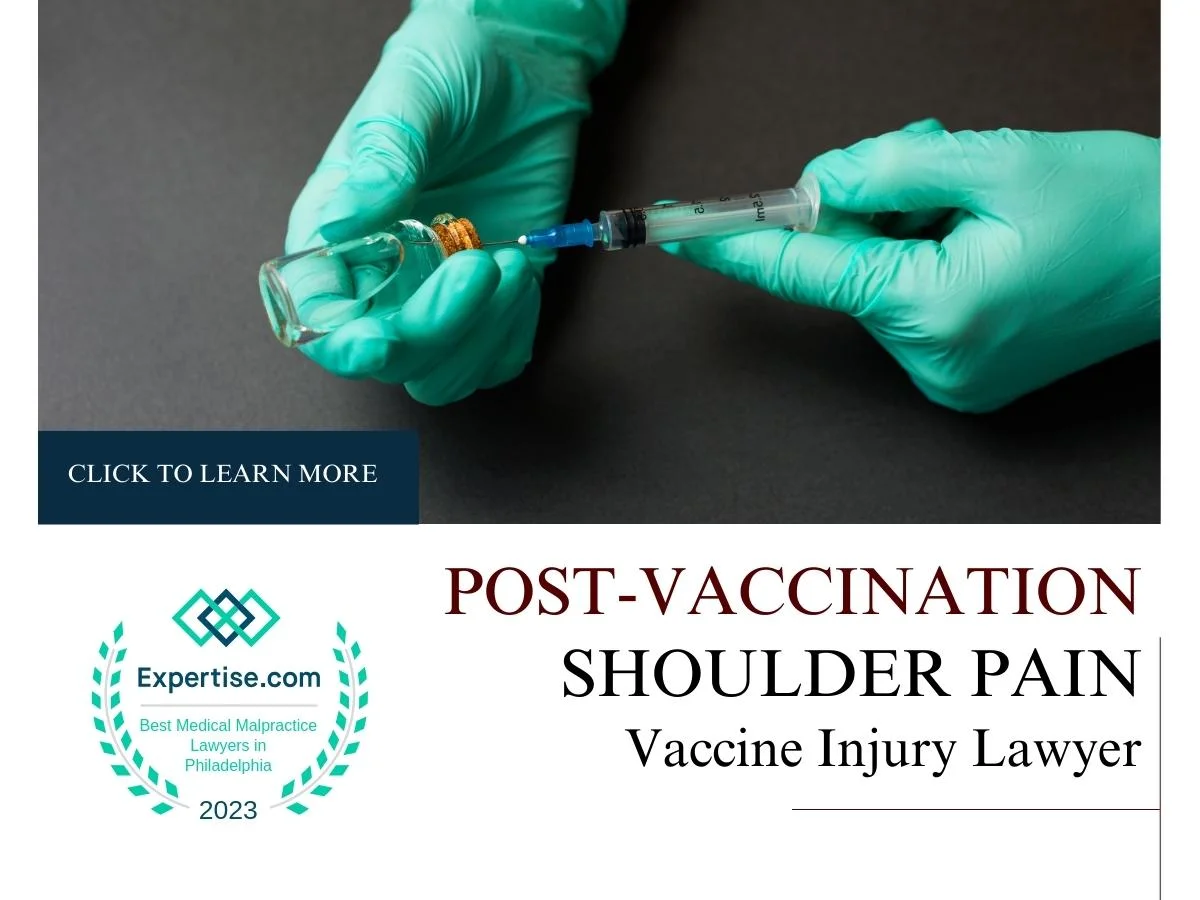Tingling After Flu Shot: Causes and Solutions
If you have recently received a flu shot and are experiencing tingling sensations in your arm and hand, you may be concerned about the possible side...
9 min read
Vaccine Injury Law Resources / Leigh Finfer / Shoulder Pain After Flu Shot - Legal Help Available
 Leigh Finfer
:
May 25, 2023 11:51:59 AM
Leigh Finfer
:
May 25, 2023 11:51:59 AM
Suppose you have recently received a flu shot and are experiencing tingling sensations in your arm and hand. In that case, you may be concerned about the vaccine's possible side effects. This can be a worrying experience, especially if you are still determining what steps to take next.
Fortunately, there are resources available to help you navigate this challenging situation. This blog post will explore tingling in the arm and hand after a flu shot and how it relates to potential vaccine injuries.
We will also discuss the importance of seeking legal assistance from a vaccine injury lawyer, especially if facing financial challenges. By the end of this post, you will better understand how to protect your rights and seek compensation for any injuries you may have experienced.
Shoulder pain following a flu shot can occur for several reasons, largely rooted in the body's normal immune response or the vaccination technique.
At the most basic level, when a flu vaccine is administered, it introduces a small piece of the flu virus into your body. This prompts your immune system to generate an immune response, creating antibodies that can recognize and fight off the real virus if you're exposed to it later. This process can cause some inflammation at the injection site, manifesting as mild soreness or discomfort in your shoulder.
On the other hand, if the vaccine is improperly administered, it may lead to more serious complications. For instance, if the vaccine is injected too high on the arm or too deep into the shoulder joint or bursa instead of the muscle, it can result in a condition known as Shoulder Injury Related to Vaccine Administration (SIRVA). SIRVA can cause severe shoulder pain and, potentially, damage to the shoulder structures, reducing your range of motion and affecting your daily activities.
It's important to remember that while these situations can occur, they are not the norm, and serious side effects from vaccines are rare. However, suppose you're experiencing intense shoulder pain or discomfort lasting more than a few days after your flu shot. In that case, it's advisable to seek medical attention. As experienced vaccine injury lawyers, we are here to guide you through any legal implications if you believe you have suffered from a vaccine-related injury.
Shoulder Injury Related to Vaccine Administration, or SIRVA, is a term used to describe a rare but serious injury that can occur after a vaccination. This injury is typically associated with improper vaccine administration techniques, specifically when the vaccine is injected into the shoulder joint or bursa rather than the intended muscle tissue.
While SIRVA can lead to chronic or sometimes permanent injury to the arm and shoulder, it's crucial to remember that most vaccinations are administered safely and without such complications. However, if you are experiencing intense shoulder pain or a decreased range of motion following vaccination, it's recommended to seek medical attention promptly.
At My Vaccine Lawyer, we understand the complexities and nuances of cases like these. Suppose you believe you have suffered from SIRVA or any other vaccine-related injury. In that case, we are here to provide the necessary legal guidance and support and to help you navigate the process of seeking compensation.
Shoulder Injury Related to Vaccine Administration (SIRVA) is relatively rare. Still, when it does occur, it can significantly impact those affected. While actual incidence rates are challenging to determine, it's estimated that a small percentage of the millions of people vaccinated each year experience severe shoulder pain and limited range of motion related to SIRVA.
The symptoms of SIRVA typically manifest within 48 hours following vaccination. These symptoms include intense shoulder pain and decreased arm mobility. They may also present as specific conditions such as rotator cuff, tendonitis, bursitis, or frozen shoulder. In some cases, patients may also experience weakness or altered sensation in the arm and shoulder stiffness.
If you notice such symptoms after receiving a vaccination, seeking medical advice promptly is important.
Shoulder Injury Related to Vaccine Administration (SIRVA) is typically attributed to the incorrect administration of a vaccine. The placement of the needle during vaccination is crucial. Suppose the vaccine is injected too high, too low, or too deep into the shoulder area. In that case, it can cause injury to the surrounding structures, such as the shoulder joint or bursa, instead of the intended muscle tissue.
The incorrect needle placement can lead to inflammation, resulting in pain and a limited range of motion in the shoulder. This improper technique can also cause a localized reaction to the vaccine serum, contributing to the symptoms of SIRVA.
If you or a loved one have experienced severe shoulder pain or reduced mobility following vaccination, we're here to provide legal guidance and support. As experienced vaccine injury lawyers, we're familiar with the complexities of SIRVA cases. We can help you navigate the process of filing a vaccine injury claim, protecting your rights, and advocating for any compensation you may be entitled to.
Suppose you notice intense shoulder pain or significantly reduced mobility in your arm that persists beyond a few days post-vaccination. In that case, it's time to consult a doctor.
Remember, Shoulder Injury Related to Vaccine Administration (SIRVA) symptoms usually arise within 48 hours of vaccination. They can include severe shoulder pain, decreased arm mobility, and potentially more specific conditions like rotator cuff tendonitis or bursitis.
What if symptoms persist and over-the-counter pain medications do not provide relief? In that case, you should make an appointment with your doctor. Diagnosing SIRVA can involve a detailed medical history, physical examination, and potentially medical imaging studies to determine the extent of any damage and inform treatment.
Diagnosing Shoulder Injury Related to Vaccine Administration (SIRVA) can be complex, primarily because shoulder pain is a common symptom shared by various medical conditions. However, a key distinctive feature of SIRVA is its association with a recent vaccination.
The diagnostic process typically involves a thorough medical history review and physical examination. Your doctor will be particularly interested in any recent vaccinations you may have received. They'll also assess your shoulder's range of motion and look for any signs of inflammation or injury.
Advanced imaging studies, such as Magnetic Resonance Imaging (MRI), may be ordered in some cases. These can provide a detailed view of the shoulder's structures, helping to determine the extent of any damage caused by SIRVA.
Remember, seeking medical attention is essential if you experience severe or persistent shoulder pain after receiving a flu shot or any other vaccination. It's equally important to consider legal assistance. As vaccine injury lawyers with extensive experience in SIRVA cases, we can guide you through the legal process and ensure your rights are upheld. If you've been injured due to a vaccine administration error, we're here to help you seek the compensation you deserve.
Suppose you've been diagnosed with Shoulder Injury Related to Vaccine Administration (SIRVA). In that case, it's crucial to understand that several treatment options are available to help manage your symptoms and improve your shoulder function. The treatment plan will be tailored to your specific symptoms and the severity of your condition.
Common treatment options for SIRVA often include prescription anti-inflammatory medications, such as Non-Steroidal Anti-Inflammatory Drugs (NSAIDs) or oral steroids. These medications can help reduce inflammation and alleviate pain.
Physical therapy is another important component of treatment. This therapy can significantly aid in alleviating pain and restoring function. A physical therapist can guide you through specific exercises to improve your shoulder's range of motion and strength.
Other interventions, such as steroid injections or surgery, may be considered in some severe or persistent cases. The specific course of treatment will depend on the extent of your injury and how well your symptoms respond to initial treatments.
While there is no guaranteed way to completely prevent Shoulder Injury Related to Vaccine Administration (SIRVA), certain steps can be taken to reduce the risk significantly. Most importantly, correct vaccine administration techniques play a critical role in prevention.
Regular training and awareness among healthcare providers regarding the potential for SIRVA and correct vaccination techniques can greatly help minimize its occurrence. Healthcare providers are trained to administer vaccines into the deltoid muscle of the upper arm, which is the recommended site for most adult vaccinations. The correct placement is crucial: too high or too low can injure the shoulder structures.
Furthermore, as a patient, you can ask the person administering your vaccine about their experience and training. You can also ask them to ensure the injection is given at the appropriate site.
Suppose you've experienced SIRVA in the past. In that case, it's crucial to communicate this to your healthcare provider before receiving any future vaccinations. They can take additional precautions to ensure the vaccine is administered correctly and safely.
As experienced vaccine injury lawyers, we understand the potential implications of SIRVA. We are here to provide legal guidance and support to individuals who have suffered from this condition due to incorrect vaccine administration. Suppose you believe you have a SIRVA case. In that case, we can help you navigate the legal process and pursue the compensation you may be entitled to.
The most persistent symptom of SIRVA is chronic shoulder pain that can extend for several months and, in rare cases, potentially become permanent. This pain can considerably impact your daily life, affecting activities that involve the use of the shoulder, such as lifting objects, performing household chores, or engaging in recreational sports.
In addition to chronic pain, decreased range of motion in the shoulder is another long-term effect. This limited mobility can further compromise your ability to perform routine tasks. You might also experience stiffness in the shoulder, making movements difficult and, at times, uncomfortable.
In certain cases, SIRVA can lead to more severe conditions like frozen shoulder, rotator cuff tendonitis, or bursitis, which have long-term implications.
While these effects can be challenging, it's important to remember that help is available. It's crucial to consult a healthcare provider if you suspect you have SIRVA. Moreover, suppose you believe your condition was due to a vaccination error. In that case, a specialized vaccine injury lawyer can guide you through the legal process to seek compensation for your pain and suffering.
Remember, every case is unique, and an early diagnosis can lead to more effective treatment strategies and a better prognosis.
Shoulder Injury Related to Vaccine Administration (SIRVA) is generally rare. It can affect individuals of any age, gender, or health status. That said, certain factors may increase an individual's susceptibility to SIRVA.
Individuals with pre-existing shoulder conditions may be more susceptible to developing SIRVA, as these conditions could potentially exacerbate the injury caused by vaccine administration.
However, the likelihood of experiencing SIRVA remains low for most individuals. It's also important to remember the immense benefits of vaccinations in preventing serious illnesses. Suppose you have concerns about vaccine administration or potential side effects. In that case, we encourage you to discuss them with your healthcare provider.
Shoulder Injury Related to Vaccine Administration (SIRVA) can potentially occur with various types of vaccines, not just the flu shot. While the flu shot has been associated with cases of SIRVA, it's important to note that SIRVA is a rare occurrence regardless of the type of vaccine administered.
The risk of SIRVA is not necessarily tied to the specific vaccine but to the technique used during the administration process. Therefore, the risk exists with any vaccine administered in the upper arm. Improper needle placement or injection into the shoulder joint or bursa instead of the intended muscle tissue can increase the risk of SIRVA.
It's essential to emphasize that the overall benefits of vaccinations far outweigh the potential risk of SIRVA or other vaccine-related injuries. Vaccinations have played a pivotal role in preventing the spread of diseases and saving lives worldwide.
Suppose you have concerns about administering any vaccine or the potential for SIRVA. In that case, discussing your concerns with a healthcare provider is advisable. They can provide personalized information and address any specific questions you may have.
As experienced vaccine injury lawyers, we understand the complexities surrounding vaccine-related injuries like SIRVA. Suppose you believe you have suffered from SIRVA due to vaccine misadministration. In that case, we are here to provide legal guidance and support throughout seeking compensation for your injury.
A vaccine injury lawyer can be crucial in assisting individuals who have experienced Shoulder Injury Related to Vaccine Administration (SIRVA). Here are some ways in which a vaccine injury lawyer can be of assistance:
A vaccine injury lawyer specializes in vaccine-related cases and possesses extensive knowledge of the legal aspects surrounding such injuries. They understand the complexities of vaccine injury law, including the specific requirements for filing a claim related to SIRVA.
A skilled vaccine injury lawyer will evaluate the details of your SIRVA case, examining factors such as the circumstances surrounding the vaccine administration, the severity of your injury, and the impact it has had on your life. This evaluation helps determine the strength of your case and the potential for seeking compensation.
A vaccine injury lawyer will provide guidance and support throughout the legal process, explaining your rights and helping you understand the available legal options. They will navigate the complexities of filing a claim, ensuring all necessary documentation is compiled and submitted correctly and within the required timeframe.
A vaccine injury lawyer will serve as your advocate, representing your best interests and fighting for fair compensation. They will negotiate with insurance companies, opposing legal teams, and other relevant parties to seek a resolution that adequately addresses your medical expenses, pain and suffering, and any loss of earnings resulting from the SIRVA injury.
A vaccine injury lawyer will provide skilled courtroom representation if your case progresses to litigation. They will present a compelling case, employing their expertise to argue for your rights and the compensation you deserve.
In a SIRVA lawsuit, a vaccine injury lawyer plays a vital role in representing individuals who have suffered from Shoulder Injury Related to Vaccine Administration. Here's a glimpse into the specific responsibilities of a vaccine injury lawyer in a SIRVA lawsuit:
A vaccine injury lawyer will thoroughly assess the facts and circumstances surrounding your SIRVA case. They will gather relevant medical records, vaccination history, and supporting evidence to build a strong case.
Based on the assessment, a vaccine injury lawyer will develop a tailored legal strategy to support your SIRVA lawsuit. This strategy considers the specific laws and regulations governing vaccine injury claims, aiming to prove that your injury resulted from the vaccine misadministration.
A vaccine injury lawyer will handle all necessary paperwork and documentation for your SIRVA lawsuit. This includes preparing and filing the required legal documents and submitting them accurately within the designated timeframes.
Your vaccine injury lawyer will negotiate with relevant parties, such as insurance companies or opposing legal teams. They aim to seek a fair settlement that adequately compensates you for your SIRVA injury, considering medical expenses, pain and suffering, and any other relevant damages.
If negotiations cannot reach a settlement, your vaccine injury lawyer will represent you in court. They will present your case, including expert testimony and supporting evidence, and advocate for your rights before a judge and jury.
A vaccine injury lawyer provides comprehensive support throughout the process, ensuring your voice is heard, and your interests are protected. If you decide to be represented by My Vaccine Lawyer, our experience and expertise in vaccine injury law can significantly enhance your chances of obtaining the compensation you deserve for your SIRVA injury.
Leigh A. Finfer is a vaccine and personal injury attorney at Muller Brazil and My Vaccine Lawyer. Mrs. Finfer has been with the firm since June 2018 and her practice includes representing vaccine injury victims, personal injury victims, and those who suffer injuries as a result of unsafe drugs and medical devices.

If you have recently received a flu shot and are experiencing tingling sensations in your arm and hand, you may be concerned about the possible side...

SIRVA (Shoulder Injury Related to Vaccine Administration) is a condition that, while rare, causes trauma and inconvenience to those affected. SIRVA...

Millions of people experience nerve damage after flu shots each year. If you have pain, numbness, or weakness, seek medical help right away. You...
